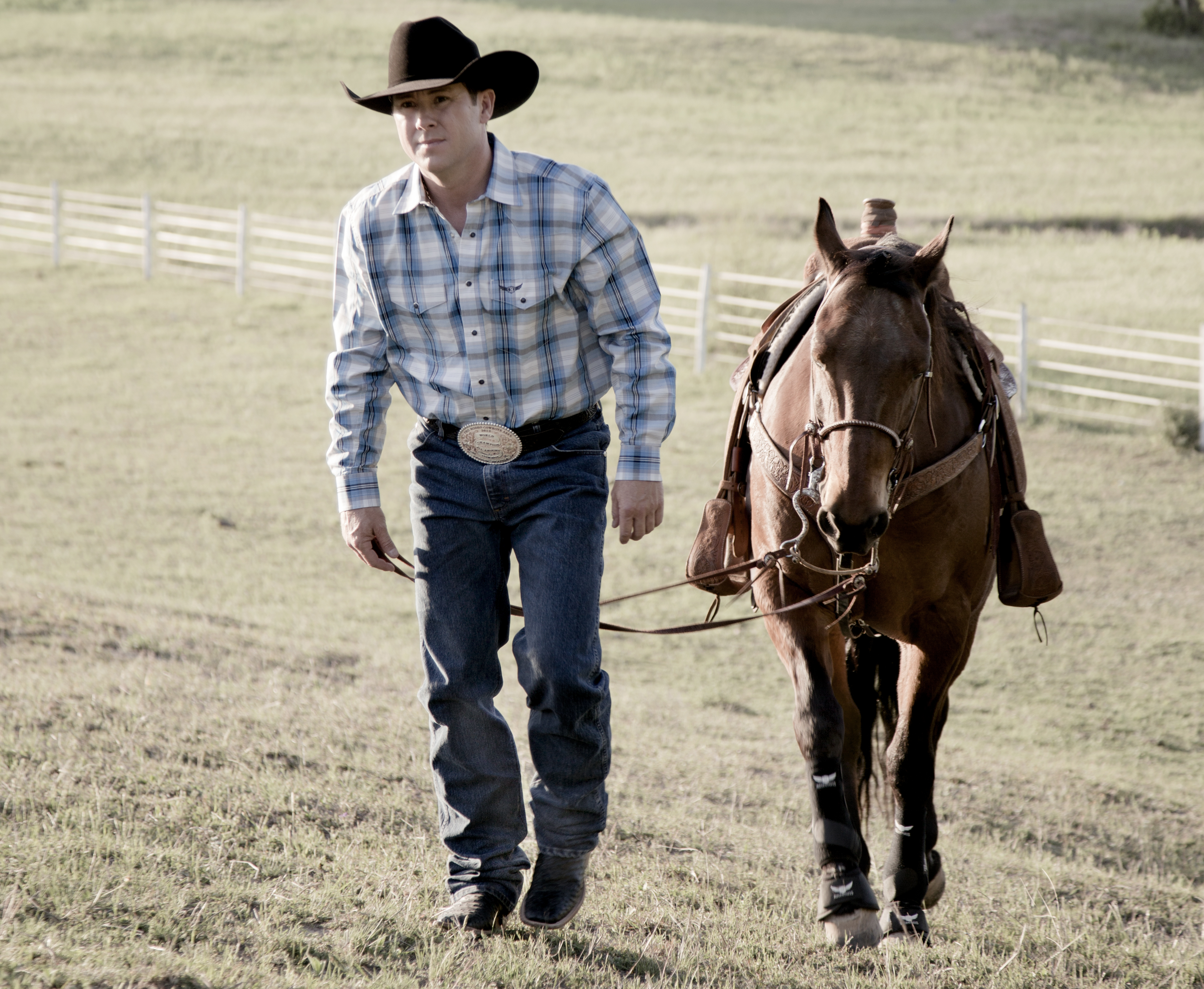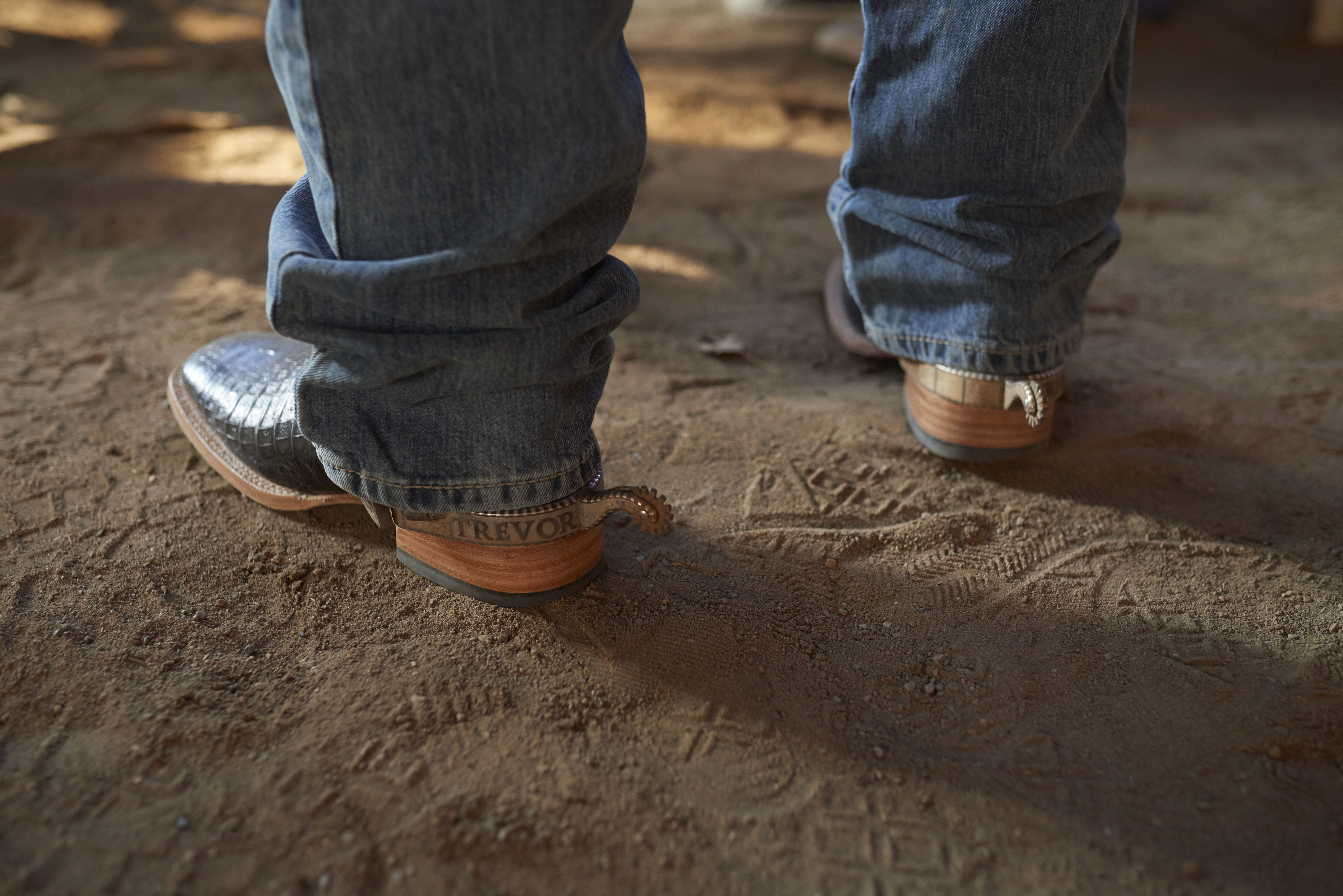
The six-time all-around world champion could notch a seventh at the 2009 National Finals Rodeo.
He’s been called “the world’s greatest cowboy.” And he’s currently the richest cowboy in PRCA history. Roping is his game — tie-down roping, team roping, and steer roping. Nine world crowns prove just how much game the guy’s got.
Having already won the Wrangler National Finals Rodeo All-Around World Championship title six times, Trevor Brazile will head into December’s NFR tied with greats like Larry Mahan and Tom Ferguson. Will the 33-year-old Brazile clinch another this year, to tie with Ty Murray for the all-time record of seven all-around world titles? As always, he’s thinking positively: “I feel as good right now as I ever have in my career.”
Once described as “Tom Brady and Kobe Bryant and Tiger Woods all rolled into one,” Brazile comes by roping expertise through his father, Jimmy. A four-time steer-roping national finalist, Jimmy had son Trevor in training to be an all-around cowboy from the time he was a toddler. While it was Brazile’s dad who got him started early mastering the physical skills, it was his father-in-law, eight-time world champion Roy Cooper, who helped him with the mental toughness.
The mind-and-body discipline has paid off — in millions. Brazile is the first PRCA cowboy to cross the $3 million threshold in career earnings, finishing the 2008 season with $3,027,539 in his lifetime purse.
Most of the money, he says, has gone to his 100-acre quarter-horse ranch outside of Decatur, Texas, near Dallas/Fort Worth. “As far as concentrated professional cowboys go,” Brazile says of the area, “I would argue that we’re rapidly becoming the cowboy capital of Texas.”
At the ranch, Brazile maintains a house with his wife, model Shada Brazile, and son, Treston, as well as an indoor-outdoor horse-training facility and a barn with two dozen quarter horses, some of which are in training to compete with him at rodeos and some of which will be sold to clients. One of these days, when Brazile retires from rodeoing, he’ll do clinics at the ranch and never have to hit the road again. But for now, he’s burning up the miles from Corpus Christi to Calgary and back, readying for the peak competition at December’s NFR in Las Vegas. We caught up with Brazile at his ranch to talk about rodeo, having the best horses, and what makes NFR so special.

Cowboys & Indians: What makes the Wrangler National Finals Rodeo different?
Trevor Brazile: The money’s great and you know you’re going up against the best in your generation every night for 10 nights. World championships are won and lost in Las Vegas. We rodeo all year, and we’ll probably win the equivalent of our season’s earnings for the whole rest of the year right there in Vegas, if we have a good week. I think I went into the finals with $230,000-plus in earnings for last year. Between my three events, I left Las Vegas at, like, $149,000. So it’s just crucial to be peaking and on your game those 10 days.
C&I: Is there camaraderie among the competitors?
Brazile: Definitely. There’s a competitive side, but there’s also the respect of knowing those are the 14 other best guys in the world at what you do.
C&I: How confident are you that you’ll tie with Ty Murray’s all-around record at this NFR?
Brazile: Well, barring any injury, I’m confident because I’m not changing anything. I’m not working any less; if [anything I’m working] more. I’m trying to keep injury-free. I’ve been going to rehab. I’ve added quickness. You can’t help getting older, but you can help getting slower.
C&I: Former bull-riding champion Gary Leffew says you haven’t reached your peak yet. What do you think?
Brazile: I don’t know. I honestly feel like I’ve never had better horses than I do this year, and I can’t stress how important that is, doing what I do. Without my horses, I’m just another cowboy.
C&I: Your father-in-law, Roy Cooper, a world champion himself, has said your work ethic is your greatest attribute. What motivates you?
Brazile: I’m about 5 foot 10, 165 pounds. Most everybody who excels at the timed events has been 6-foot or bigger, and close to 200 pounds. That makes me work harder personally and work harder to make sure I have the best horses. If I’ve got the best partner when I show up, it’s kind of my equalizer.
C&I: What did you learn from Roy?
Brazile: Roy taught me more about confidence and winning than anything else. There are a lot of guys that rope good, but there’s a big difference between guys that rope good and guys that win. You gotta win. A lot of it’s mental. You’ve got to be real positive and a realist, too. You’ve got to know your strengths and weaknesses, and daily try to get better. The main thing — once you know you’re doing everything you can do — is to have a short memory of things gone wrong. That’s the biggest deal.
C&I: Speaking of overcoming things gone wrong, last year at the NFR you won third in tie-down roping, competing with an MCL sprain of your right knee. Is that the worst injury you’ve ever competed with?
Brazile: The year before I had a ruptured disc after the first round of finals! The most painful was a tossup between the ruptured disc and the MCL.
C&I: How do you get psyched to ride?
Brazile: I do stretching. When you hear the national anthem, the adrenaline just kicks in and takes over
C&I: What was your first experience like at the NFR, and how’s it different now?
Brazile: My first few times in the calf roping, I tried to rush some things instead of letting them happen. Maturity has played a big part in my success in the calf roping the last few years.
C&I: What’s been your most gratifying moment so far at NFR?
Brazile: The very first year I won the world championship in ’02 and the all-around. It came down to the very last round. I had to win second or better in the tie-down roping to secure it for sure. I won second. I was pretty sure I’d done it, but I’d never won a world championship before and I didn’t know if everybody’s figures were right. They grab you, and you’re going down behind the chutes in between the bull-riding chutes after the rodeo’s over. The stage drops down. The fog machines roll that fog through there. And you hear them announcing everybody else’s name. Then they got to the all-around champ and they said my name for the first time. I haven’t had a feeling like that since. Just being able to walk out there when they said, “Here’s your all-around champion!” — that was probably the pinnacle for me. It’s definitely been more pressure each additional year. Once you’ve won, it’s yours to lose.
C&I: They say Justin McBride earns $25,000 per second, or $200,000 for an eight-second ride. How do your event monies stack up?
Brazile: I’m trying to do everything before eight seconds, and he’s trying to hang on at least eight seconds, so we’ve got a little different motive there. Somebody would have to tell me what I make per second; I know Justin didn’t figure that out.
C&I: After rodeo, any plans to become a country singer like Justin?
Brazile: Zero!
C&I: Tell me about this Foretravel motorcoach you just got as part of an endorsement deal. I hear it would cost upwards of half a mil.
Brazile: I’ve seen their buses forever, and knowing the great chassis they put under those things, I knew that’s where I’d be going. We had to make everything family-friendly for Treston.
C&I: Who drives it — you or Shada?
Brazile: Me, the majority of the time. And my friend Chad Baker. Shada can handle it whenever, whatever. She grew up around the rodeo.
C&I: And she’s so familiar with the lifestyle that she’s designed her own line of baby clothes for Wrangler. Did you offer Shada your opinion?
Brazile: Oh, for sure. That’s not one of my weaknesses — holding my opinion back. I love the line. I like the pearl-button shirts, making those into the onesies.
C&I: Could you and Shada be convinced to go on Dancing with the Stars like Ty Murray and Jewel?
Brazile: I would look into that. I’m pretty reserved, but my hat’s off to Ty. When he accepted it, I think it was good for America to see how much tryin’ heart he had. Because to be as good a cowboy as he is, you don’t do that without that tryin’ heart. He’s a first-class act in my eyes. He’s probably the best thing that’s ever happened to the cowboy or Western industry.
C&I: What’s the best advice you could give somebody wanting to compete in rodeo?
Brazile: Make sure it’s what you want to do, because it’s not all roses and there are definitely bigger paydays in other industries. There’s better ways to make a living, but there’s probably no better way to live.
From the December 2009 issue.












